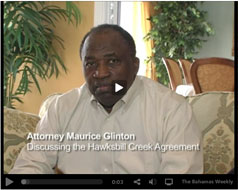|
From:TheBahamasWeekly.com Video
There is absolutely no doubt that Maurice Glinton, Attorney-at-Law,
has made a refreshing difference in Grand Bahama since he became a
resident some 30 years ago. He has added sophistication and
professionalism to the Bahamas Bar and his presence greatly enhances the
legal fraternity in Grand Bahama. It is said in some circles that
Glinton operates at another level, beyond that of the really good
lawyer. This barrister is a joy to behold at work, arguing and
presenting cases. Over the years, Glinton has been a strong advocate
for educating the masses from a legal perspective.
Once, he was a constant letter writer to the print media. His
material went to great lengths to bring clarity to legal matters for the
ordinary citizens, the average readers of newspapers. It was a vital
role he played and he took it as an obligation to structure his schedule
to be able to make that contribution on a regular basis. In recent
years, the letter writing has not been as steady, but Maurice Glinton
Esquire always remained ready and willing to pass on legal
explanations to those seeking the same.
He has gone his merry way, dictated by nothing other than his convictions and his knowledge of the law.
Glinton is a soldier for change, based on the law and at times he has
been the lone warrior for justice, making his points on the essence of
the law. In a sense he could be called a legal maverick. When you deal
with Maurice Glinton, you get the ultimate professional and that's it,
no affiliations and no attachments, just the man and the law as he
understands it.
The learned gentlemen was always somewhat of a loner in any event. In
his early life, when he became the high school sprint champion at
Government High School, he was underestimated. He was not from an
affluent family background and was not expected to achieve very much. He
dug deep however, and there he was at the finish of the prestigious
national century event, striding beyond the field.
He was a sports champion then and today he is a champion of the people.
The general public has little knowledge of the many legal causes he champions.
He is well-suited for his role because of a distinguished background.
Glinton read law at Cambridge University (St. John's College). He is a
barrister of Gray's Inn (London) and was called to the Bahamas Bar in
1980. He didn't enter the practice of law right away. After graduating
from Government High, he enrolled at the University of Maine as an
undergraduate student. For a while he continued to run track and did
rather well, establishing sprint marks.
The emphasis however was on academics. At Maine, he obtained a
Bachelor's Degree in Economics. The completion of graduate studies in International Relations followed at Lehigh University in Pennsylvania and
he earned a Master's Degree.
As aforementioned, he has penned lots of legal material for the
public to peruse and digest. Many of his articles on aspects of
Constitutional Law and Law Reform have been published.
His focus has been "Judicial Independence, the Governmental Role of
the Judiciary in Constitutional Development and Fundamental Rights
Adjudication in The Bahamas."
Yes, he is quite different.
He is known for his special brand of legal work at home and abroad.
Without a doubt, he is a plus factor, for the entire Commonwealth of The Bahamas, but particularly for Grand Bahama." (SOURCE)
[ Southern Electric, Sir Jack Hayward, Edward St. George, Trust Assets, Freeport Power, DEVCO, Licensees, Potential investors, Pine barren, Shareholdings, Ownership of the Port, 7 1/2 percent, Promissory note, Rate increase, Pledge of shares, Legal process, ]
|
